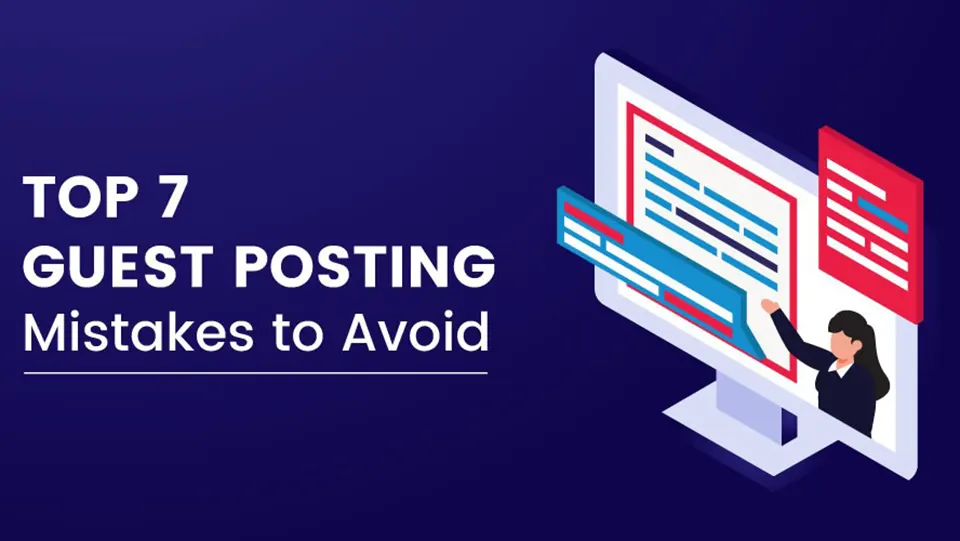Posted on January 8, 2025
Guest posting is a powerful strategy for growing your online presence, building backlinks, and establishing authority in your niche. But let’s be honest—many people dive into guest posting without fully understanding the process, and they end up making avoidable mistakes. These missteps can not only waste your time but also harm your reputation.
If you’ve been wondering why your guest posting efforts aren’t yielding results, chances are you’re committing one or more common guest posting mistakes. In this guide, we’ll break down these mistakes in detail and provide actionable solutions to help you avoid them.
Ignoring the Target Audience of the Blog
Why This Mistake Happens:
It’s easy to get so focused on your goals—building links, boosting traffic, or promoting your expertise—that you overlook the blog’s primary audience. However, blogs exist to serve their readers, not your agenda.
How This Affects Your Efforts:
If your content doesn’t align with the blog’s tone or audience interests, it’s likely to be rejected. Even if it gets published, it won’t perform well because readers won’t find it relevant.
How to Avoid It:
- Research is Key: Spend time exploring the blog’s existing content. Look for patterns in the type of topics covered, the tone (formal, conversational, technical), and the depth of detail.
- Understand the Audience: Check the comments section, social media shares, or any available audience demographics. Tailor your content to solve their specific problems or answer their burning questions.
Example: If you’re writing for a blog targeting beginner photographers, avoid using jargon or advanced techniques without explanation. Instead, break down concepts into digestible steps.
Focusing Only on Self-Promotion
Why This Mistake Happens:
It’s tempting to view guest posting as free advertising space, but this mindset is a trap. Blogs are looking for contributors who bring value, not those who shamelessly promote themselves.
How This Affects Your Efforts:
Excessive self-promotion makes your post feel like an infomercial, turning off readers and blog owners alike. It also damages your credibility as a contributor.
How to Avoid It:
- Adopt a “Value First” Approach: Your primary goal should be to educate, entertain, or inspire the blog’s audience. Think about what they’ll gain from reading your post.
- Be Strategic with Links: Limit yourself to one or two links that fit naturally within the content. Focus on linking to high-quality, relevant resources on your site rather than your homepage or sales pages.
Not Following Submission Guidelines
Why This Mistake Happens:
Skipping over submission guidelines is often due to impatience or overconfidence. You might assume your brilliant content will overshadow minor rule-breaking, but it won’t.
How This Affects Your Efforts:
Blog owners receive countless submissions. Ignoring their guidelines shows a lack of professionalism and makes their job harder, reducing the chances of your post being accepted.
How to Avoid It:
- Read Twice, Submit Once: Carefully review the blog’s guidelines before you start writing. Pay attention to word count limits, preferred formats, and any required elements like images or author bios.
- Ask for Clarifications: If something in the guidelines isn’t clear, don’t hesitate to ask. It shows that you’re serious about meeting their expectations.
Choosing Irrelevant or Generic Topics
Why This Mistake Happens:
Some writers pitch topics they’re comfortable with, regardless of whether they align with the blog’s niche or have been overdone.
How This Affects Your Efforts:
Irrelevant or stale topics don’t grab attention, and editors are unlikely to accept them. Even if they do, such posts won’t resonate with the blog’s audience.
How to Avoid It:
- Conduct a Content Audit: Use the blog’s search bar to check if your proposed topic has already been covered. If it has, think about how you can approach it from a fresh angle.
- Leverage Trending Topics: Tools like Google Trends, BuzzSumo, and Answer the Public can help you identify popular subjects in your industry.
Pro Tip: Avoid overly broad topics. Instead, go niche. For example, instead of “How to Improve SEO,” try “5 Local SEO Tactics for Small Business Owners.”
Poor Writing Quality
Why This Mistake Happens:
Some people underestimate the importance of writing quality, assuming that editors will clean up their work. Others rush through the process to save time.
How This Affects Your Efforts:
Low-quality writing damages your credibility and can result in outright rejection. Even if it’s accepted, a poorly written post won’t engage readers or encourage them to visit your site.
How to Avoid It:
- Edit Like a Pro: Review your draft multiple times. Use tools like Grammarly or Hemingway Editor to catch errors and improve readability.
- Practice Makes Perfect: If you struggle with writing, invest time in improving your skills through online courses or workshops. Alternatively, consider hiring a professional editor.
Overlooking SEO Best Practices
Why This Mistake Happens:
Some guest writers focus solely on the content and forget about SEO, assuming it’s the blog owner’s responsibility.
How This Affects Your Efforts:
Without SEO optimization, your post won’t rank well in search engines, limiting its reach and impact.
How to Avoid It:
- Optimize Headings and Subheadings: Use your main keyword (guest post mistakes) in the title and at least one subheading.
- Sprinkle Keywords Naturally: Incorporate related keywords throughout the content, but avoid keyword stuffing.
- Pay Attention to Formatting: Use bullet points, numbered lists, and shorter paragraphs to improve readability, which also helps with SEO.
Failing to Engage Post-Publication
Why This Mistake Happens:
Once the post is published, some writers see it as “mission accomplished” and move on to the next task.
How This Affects Your Efforts:
Ignoring comments or failing to promote the post means you’re missing out on opportunities to connect with readers and build relationships.
How to Avoid It:
- Be Active in the Comments Section: Answer questions, thank readers for their feedback, and join discussions. This shows that you’re approachable and invested in the community.
- Promote on Social Media: Share the post with your followers and tag the blog owner. Encourage your audience to check it out and leave comments.
Not Tracking Results
Why This Mistake Happens:
Many people treat guest posting as a set-it-and-forget-it strategy, failing to monitor how their posts perform.
How This Affects Your Efforts:
Without tracking, you can’t measure the success of your guest posting campaigns or identify areas for improvement.
How to Avoid It:
- Use UTM Parameters: Add tracking codes to your backlinks to monitor traffic in Google Analytics.
- Analyze Performance Metrics: Pay attention to referral traffic, engagement (comments, shares), and conversions from your guest posts.
- Refine Your Strategy: Use the data to improve your topic selection, writing style, and outreach process.

Bonus Tips for Guest Posting Success
- Build Relationships First: Instead of cold-pitching blogs, engage with their content and interact with their community before submitting a guest post.
- Be Professional: Treat guest posting as a collaboration. Meet deadlines, be open to feedback, and thank blog owners for the opportunity.
- Keep Learning: The guest posting landscape evolves. Stay updated on best practices and adapt your approach as needed.
Wrapping It Up
Guest posting is more than just writing articles—it’s about building relationships, providing value, and growing your online presence strategically. By avoiding these common guest posting mistakes and implementing the solutions we’ve discussed, you can set yourself apart as a reliable and valuable contributor.
Remember, success in guest posting doesn’t happen overnight. It requires patience, persistence, and a commitment to quality. Follow these tips, and you’ll not only get your posts published but also create a lasting impact in your niche.

